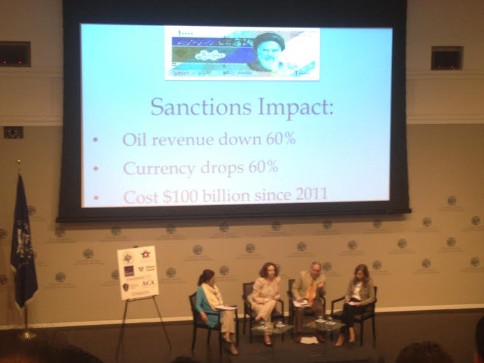
USIP: Iran Sanctions and What the U.S. Cedes in a Nuclear Deal
The United States Institute of Peace (USIP) held a panel on July 8 to discuss the challenges of sanctions in the Iran nuclear talks. The panel began by stating that since the 1979 Iranian revolution, there have been 16 executive orders from the White House, 10 statutes from Congress, and 4 UN Security Council Resolutions, giving rise to a global sanctions regime against Iran.
Three main recent impacts of sanctions on Iran:
- Oil revenues in Iran are down 60%, plummeting from $100 billion in 2011 to $35 billion in 2013.
- Iran’s currency, the rial, has lost 60% of its value since 2011.
- U.S. and E.U. sanctions have cost Iran over $100 billion in lost sales since 2011.
Additionally, Kenneth Katzman, senior Middle East analyst at the Congressional Research Service, added that the International Monetary Fund (IMF) reported Iran’s economy has shrunk by 6% in 2013 and will continue to do poorly in 2014.
Mr. Katzman believes that Iran will demand the lifting of sanctions imposed after UN Security Council Resolution 1929 (June of 2010), since sanctions ramped up dramatically after this time to force Iran to the negotiating table. This would include the suspension of secondary sanctions that apply to US foreign companies and foreign entities doing business with Iran. He also drew attention to the difficulty of defining what a nuclear sanction is, since Iran will likely claim that any sanction intended to bring them to the negotiating table is a nuclear sanction, even if the sanction was imposed for supporting terrorism in the region or human rights violations.
Mr. Katzman believes that the President will waive sanctions in order to provide sanctions relief, however he warned that two years down the road, especially when the Iran Sanctions Act expires on December 31, 2016, Iran will want the waiving of sanctions to stop and will want permanent sanctions relief. He pointed out that Congress will be more willing to provide sanctions relief if the issue of an Iranian nuclear weapon is completely off the table. If this is not the case, then there will be more skepticism in Congress, which could complicate a deal.
Elizabeth Rosenberg, senior fellow at the Center for a New American Security, added to Mr. Katzman’s statement by emphasizing that the P5+1 should beware of overpromising sanctions relief since this could weaken their credibility. She then clarified that even if Iran were provided significant sanctions relief, there would still not be an immediate surge in foreign investment in the country.
She provided five reasons for foreign investor caution in Iran:
- Uncertainty of whether a nuclear deal will hold.
- Sanctions will still be enforced for supporting terrorism, human rights violations, etc.
- Violating sanctions is expensive (HSBC paid a $1.9 billion fine in 2012 for breaching US sanctions against Iran)
- Iran has a challenging business environment, rampant with corruption
- Congress has the ability to undermine a nuclear deal by either rejecting it or imposing new sanctions (such as terrorist-related sanctions) as the nuclear deal begins.
Suzanne Maloney, senior fellow at the Brookings Institution, expressed that what Iranians would like out of a nuclear deal is to be able to do business with the world in a normal fashion in order to boost their economy. Iran’s trade is restricted to barter trade and constricted to countries with which it has significant oil revenue deposits because of the difficulty in repatriating oil revenues. She asserted that Iran needs to be able to transact its business with the rest of the world through the international financial system with the use of SWIFT electronic payments, and it needs to be able to access its resources in international banks around the world.
ASP supports the use of sanctions in order to get Iran to the negotiating table. ASP also believes that the best solution to the Iranian nuclear crisis is a diplomatic resolution. For more information on Iranian sanctions, please see ASP’s Fact Sheet, “Significant Iranian Sanctions Since 1995.”
Theresa Shaffer is a nuclear security researcher and intern at the American Security Project. She is a recent graduate of the University of North Texas with degrees in International Studies and French. You can follow her on twitter here: Theresa Shaffer






[…] USIP: Iran Sanctions and What the U.S. Cedes in a Nuclear Deal […]
Thank you, I’ve recently been searching for info approximately this topic for
a while and yours is the greatest I have found out till now.
However, what in regards to the conclusion?
Are you positive in regards to the supply?